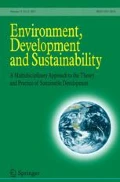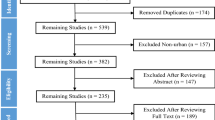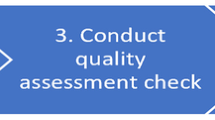Abstract
Cities have an increasingly important role in fighting against climate change, and to tackle this challenge, ambitious sustainability goals have been declared by a number of city councils. This has motivated the emergence of various sustainability-related city concepts, such as ‘sustainable city’, ‘eco city’, ‘carbon-neutral city’, however, without clarity on definition and relations between various concepts. On the other hand, digital advances and participatory trends have led to the popularity of the concept of smart city that is seen as a major driver for sustainable transformation. Digital solutions can improve efficiency in cities’ service provision as they need to serve increasing population with limited resources due to quick urbanisation. This study provides a new angle to the debate on different city concepts by examining how smartness and sustainability are presented in the city strategies of six largest Finnish cities. We used content analysis to explore the extent to which smartness and sustainability aspects are addressed in the city strategies and how smartness and sustainability goals overlap with each other. The results suggest that the majority of goals presented in the city strategies are related to social and economic sustainability, whereas environmental sustainability is less addressed. Less than one-third of the goals are related to a smartness aspect. An important observation is that most smartness aspects overlap with either social or economic sustainability, whereas overlapping with environmental sustainability is more rare. These findings provide information for the on-going academic discussion regarding the concepts of smart and sustainable cities and recommends adopting the concept of smart sustainable cities, in order to comprehensively cover the needs of contemporary cities.





Similar content being viewed by others
References
Affolderbach, J., & Schulz, C. (2017). Positioning Vancouver through urban sustainability strategies? The greenest city 2020 action plan. Journal of Cleaner Production, 164, 676–685.
Ahvenniemi, H., Huovila, A., Pinto-Seppä, I., & Airaksinen, M. (2017). What are the differences between smart and sustainable cities? Cities, 60A, 234–245.
Angelidou, M. (2017). The role of smart city characteristics in the plans of fifteen cities. Journal of Urban Technology, 24(4), 3–28.
Angelidou, M., Psaltoglou, A., Komninos, N., Kakderi, C., Tsarchopoulos, P., & Panori, A. (2017). Enhancing sustainable urban development through smart city application. Journal of Science and Technology Policy Management, 9(2), 146–169.
Anthopoulos, L. (2017). Smart utopia VS smart reality: Learning by experience from 10 smart city cases. Cities, 63, 128–148.
Balducci, F., & Ferrara, A. (2018). Using urban environmental policy data to understand the domains of smartness: An analysis of spatial autocorrelation for all the Italian chief towns. Ecological Indicators, 89, 386–396.
Bibri, S. E., & Krogstie, J. (2017). Smart sustainable cities of the future: An extensive interdisciplinary literature review. Sustainable Cities and Societies, 31, 183–212.
Bifulco, F., Tregua, M., Amitrano, C. C., & D’Auria, A. (2016). ICT and sustainability in smart cities management. International Journal of Public Sector Management, 29(2), 132–147.
Bouzguenda, I., Alalouch, C., & Fava, N. (2019). Towards smart sustainable cities: A review of the role digital citizen participation could play in advancing social sustainability. Sustainable Cities and Society, 50, 1–15.
Caragliu, A., Del Bo, C., & Nijkamp, P. (2011). Smart cities in Europe. Journal of Urban Technology, 18(2), 65–82.
Caragliu, A., & Del Bo, C. F. (2018). Smart innovative cities: The impact of smart city policies on urban innovation. Technological Forecasting and Social Change. https://doi.org/10.1016/j.techfore.2018.07.022.
Centre on Governance. (2003). Smartcapital evaluation guidelines report: Performance measurement and assessment of smartcapital. University of Ottawa, Ottawa, Canada. Retrieved June 11, 2019, from http://www.christopherwilson.ca/papers/Guidelines_report_Feb2003.pdf.
City of Espoo. (2017). The Espoo story. Retrieved June 13, 2019, from https://www.espoo.fi/en-US/City_of_Espoo/Decisionmaking/The_Espoo_Story.
City of Helsinki. (2017). The most functional city in the world: Helsinki city strategy 2017–2021. Retrieved June 13, 2019, from https://www.hel.fi/helsinki/en/administration/strategy/strategy/city-strategy/.
City of Oulu. (2018). Kaupunkistrategia Oulu 2020. Retrieved June 13, 2019, from https://www.ouka.fi/c/document_library/get_file?uuid=3cd43780-be77-4bd9-9f09-96d93811cd9a&groupId=52058.
City of Tampere. (2017). Tampere—The best for you. Tampere city strategy 2030. Retrieved June 13, 2019, from https://www.tampere.fi/tiedostot/s/bGk985LuH/Tampere_City_Strategy_2030_Final.pdf.
City of Turku. (2018). Turku 2029—The northern Baltic’s most interesting city. Retrieved June 13, 2019, from https://www.turku.fi/sites/default/files/atoms/files//turku_city_strategy.pdf.
City of Vantaa. (2017). Valtuustokauden strategia 2018–2021. Retrieved June 13, 2019, from https://www.vantaa.fi/instancedata/prime_product_julkaisu/vantaa/embeds/vantaawwwstructure/136267_Valtuustokauden_strategia_2018-2021.pdf.
Colding, J., & Barthel, S. (2017). An urban ecology critique on the “Smart City” model. Journal of Cleaner Production, 164, 95–101.
Dassen, T., Kunseler, E., & van Kessenich, L. M. (2013). The sustainable city: An analytical-deliberative approach to assess policy in the context of sustainable urban development. Sustainable Development, 21(3), 193–205.
de Jong, M., Joss, S., Schraven, D., Zhan, C., & Weijnen, M. (2015). Sustainable–smart–resilient–low carbon–eco–knowledge cities; making sense of a multitude of concepts promoting sustainable urbanization. Journal of Cleaner Production, 109, 25–38.
De Santis, R., Fasano, A., Mignolli, N., & Villa, A. (2014). Smart city: fact and fiction. Munich Personal RePEc Archive, MPRA, no. 54536. March 2014.
Drisko, J. W., & Maschi, T. (2015). Content analysis. Oxford: Oxford University Press. https://doi.org/10.1093/acprof:oso/9780190215491.003.0002.
Elgazzar, R. F., & El-Gazzar, R. (2017). Smart cities, sustainable cities, or both? A critical review and synthesis of success and failure factors. In Proceedings of the 6th international conference on smart cities and green ICT systems—Volume 1: SMARTGREENS (pp. 250–257), Porto, Portugal.
European Commission. (2012). Smart cities and communities—European innovation communication from the commission. Retrieved November 22, 2019, from http://ec.europa.eu/eip/smartcities/files/ec_communication_scc.pdf.
European Union. (2018). Indicators for sustainable cities. Science for Environment Policy. Retrieved November 22, 2019, from https://ec.europa.eu/environment/integration/research/newsalert/pdf/indicators_for_sustainable_cities_IR12_en.pdf.
Fu, Y., & Zhang, X. (2017). Trajectory of urban sustainability concepts: A 35-year bibliometric analysis. Cities, 60, 113–123.
Giddings, B., Hopwood, B., & O’Brien, G. (2002). Environment, economy and society: Fitting them together into sustainable development. Sustainable Development, 10, 187–196.
Giffinger, R., Fertner, C., Kramar, H., Kalasek, R., Pichler-Milanovic, N., & Meijers, E. (2007). Smart cities ranking of European medium-sized cities. Report of the Centre of Regional Science, Vienna University of Technology, Vienna. Retrieved May 17, 2019, from http://www.smart-cities.eu/download/smart_cities_final_report.pdf.
Glasmeier, A., & Christopherson, S. (2015). Thinking about smart cities. Cambridge Journal of Regions, Economy and Society, 8, 3–12.
Gonzalez-Garcia, S., Manteiga, R., Moreira, M. T., & Feijoo, G. (2018). Assessing the sustainability of Spanish cities considering environmental and socio-economic indicators. Journal of Cleaner Production, 178, 599–610.
Harrison, C., Eckman, B., Hamilton, R., Hartswick, P., Kalagnanam, J., Paraszczak, J., et al. (2010). Foundations for smarter cities. IBM Journal of Research and Development, 54(4), 1–16.
Hollands, R. G. (2008). Will the real smart city please stand up? Intelligent, progressive or entrepreneurial? City, 12(3), 303–320.
Hoornweg, D., Sugar, L., Lorena, C., & Gomez, L. T. (2011). Cities and greenhouse gas emissions: Moving forward. Environment & Urbanization, 23(1), 207–227.
Huovila, A., Bosch, P., & Airaksinen, M. (2019). Comparative analysis of standardized indicators for Smart sustainable cities: What indicators and standards to use and when? Cities, 89, 141–153.
Ibrahim, M., El-Zaart, A., & Adams, C. (2018). Smart sustainable cities roadmap: Readiness for transformation towards urban sustainability. Sustainable Cities and Societies, 37, 530–540.
IPCC. (2018). The IPCC and the sixth assessment cycle. Retrieved February 28, 2019, from https://www.ipcc.ch/pdf/ar6_material/AC6_brochure_en.pdf.
ISO (the International Organization for Standardization). (2018a). ISO 37120:2018 Sustainable cities and communities—Indicators for city services and quality of life. Second edition 2018-07. Retrieved June 10, 2019, from https://www.iso.org/obp/ui/#iso:std:iso:37120:ed-2:v1:en.
ISO (the International Organization for Standardization). (2018b). ISO/DIS 37122:2018 Sustainable development in communities—Indicators for Smart Cities. Published 2018-06-06.
ITU-T FG-SSC. (2015). Focus group on smart sustainable cities. Retrieved June 9, 2019, from https://www.itu.int/en/ITU-T/focusgroups/ssc/Pages/default.aspx.
John, B., Keeler, L. W., & Lang, D. J. (2015). How much sustainability substance is in urban visions? An analysis of visioning projects in urban planning. Cities, 48, 86–98.
Krippendorff, K. (2013). Content analysis. An introduction to its methodology (3rd edn.). California, CA: Sage Publications.
Lara, A. P., Da Costa, E. M., Furlani, T. Z., & Yigitcanlar, T. (2016). Smartness that matters: Towards a comprehensive and human-centred characterisation of smart cities. Journal of Open Innovation: Technology, Market and Complexity, 2(8), 13.
Lee, J. H., Hancock, M. G., & Hu, M.-C. (2014). Towards an effective framework for building smart cities: Lessons from Seoul and San Francisco. Technological Forecasting and Social Change, 89, 80–99.
Macke, J., Sarate, J. A. R., & Moschen, S. A. (2019). Smart sustainable cities evaluation and sense of community. Journal of Cleaner Production, 239, 1–8.
Malekpour, S., Brown, R. R., & de Haan, F. J. (2015). Strategic planning of urban infrastructure for environmental sustainability: Understanding the past to intervene for the future. Cities, 46, 67–75.
Martin, C. J., Evans, J., & Karvonen, A. (2018). Smart and sustainable? Five tensions in the visions and practices of the smart-sustainable city in Europe and North America. Technological Forecasting and Social Change, 133, 269–278.
Martos, A., Pacheco-Torres, R., Ordóñez, J., & Jadraque-Gago, E. (2016). Towards successful environmental performance of sustainable cities: Intervening sectors. A review. Renewable and Sustainable Energy Review, 57, 479–495.
Meijer, A., & Bolivar, M. P. R. (2016). Governing the smart city: A review of the literature on smart urban governance. International Review of Administrative Science, 82(2), 392–408.
Monfaredzadeh, T., & Berardi, U. (2015). Beneath the smart city: Dichotomy between sustainability and competitiveness. International Journal of Sustainable Building Technology and Urban Development, 6(3), 140–156.
Nam, T., & Pardo, T. A. (2011). Conceptualizing smart city with dimensions of technology, people, and institutions. In The proceedings of the 12th annual international conference on digital government research (pp. 282–291).
Shaker, R. R. (2018). A mega-index for the Americas and its underlying sustainable development correlations. Ecological Indicators, 89, 466–479.
Sodiq, A., Baloch, A. A. B., Khan, S. A., Sezer, N., Mahmoud, S., Jama, M., et al. (2019). Towards modern sustainable cities: Review of sustainability principles and trends. Journal of Cleaner Production, 227, 972–1001.
Trindade, E. P., Hinnig, M. P. F., da Costa, E. M., Marques, J. S., Bastos, R. C., & Yigitcanlar, T. (2017). Sustainable development of smart cities: A systematic review of the literature. Journal of Open Innovation: Technology, Market, and Complexity, 3, 11.
Vanolo, A. (2014). Smartmentality: The smart city as disciplinary strategy. Urban Studies, 51(5), 883–898.
Viitanen, J., & Kingston, R. (2014). Smart cities and green growth: Outsourcing democratic and environmental resilience to the global technology sector. Environment and Planning A, 46, 803–819.
Washburn, D., Sindhu, U., Balaouras, S., Dines, R. A., Hayes, N. M., & Nelson, L. E. (2010). Helping CIOs understand “Smart City” initiatives. Defining the smart city, its drivers, and the role of the CIO. Cambridge, MA: Forrest Research.
Weber, R. (1990). Basic content analysis (2nd ed.). Thousand Oaks, CA: Sage.
Yigitcanlar, T. (2015). Smart cities: An effective urban development and management model? Australian Planner, 52(1), 27–34.
Yigitcanlar, T., & Kamruzzaman, Md. (2018). Does smart city policy lead to sustainability of cities? Land Policy, 73, 49–58.
Yigitcanlar, T., Kamruzzaman, M., Foth, M., Sabatini, J., da Costa, E., & Ioppolo, G. (2019). Can cities become smart without being sustainable? A systematic review of the literature. Sustainable Cities and Society, 45, 348–365.
Yigitcanlar, T., & Lee, S. H. (2014). Korean ubiquitous-eco-city: A smart-sustainable urban form or a branding hoax? Technological Forecasting and Social Change, 89, 100–114.
6Aika. Smart Cities work together. Retrieved February 28, 2019, from https://6aika.fi/in-english/.
Author information
Authors and Affiliations
Corresponding author
Additional information
Publisher's Note
Springer Nature remains neutral with regard to jurisdictional claims in published maps and institutional affiliations.
Appendix
Rights and permissions
About this article
Cite this article
Ahvenniemi, H., Huovila, A. How do cities promote urban sustainability and smartness? An evaluation of the city strategies of six largest Finnish cities. Environ Dev Sustain 23, 4174–4200 (2021). https://doi.org/10.1007/s10668-020-00765-3
Received:
Accepted:
Published:
Issue Date:
DOI: https://doi.org/10.1007/s10668-020-00765-3




